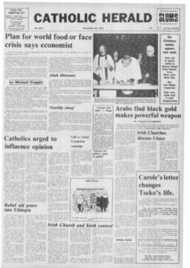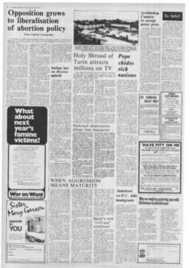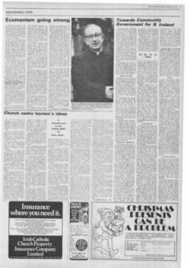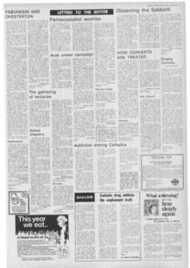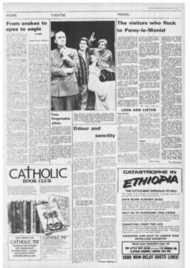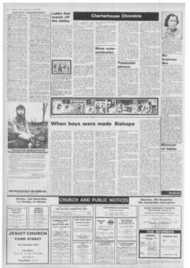Page 7, 30th November 1973
Page 7
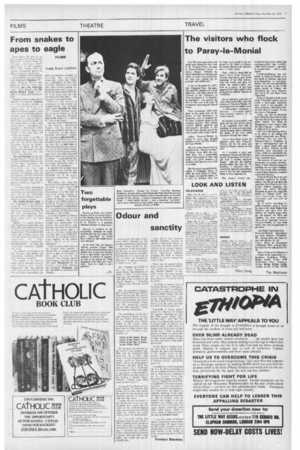
Report an error
Noticed an error on this page?If you've noticed an error in this article please click here to report it.
Tags
Share
Related articles
Rants Don't Save Lives
Hymn Translations
Oscar Wilde: Catholic, But Not Irish
What, Exactly, Are The Real Problems?
My Ireland
Odour and sancti
It was really the smell of the tinker which offended me. He was like a definition of pollution — the wrong matter in the wrong place, at the wrong time. On my way to catch the plane from Dublin Airport to London I had dashed into the chapel of the Convent of Perpetual Adoration, in Merrion Square, to make a brief visit.
As I fingered the button al the holy water dispenser mean things, like measures on bottles in pubs --I smelt, rather than saw, the tall tinker in the half-light of the entrance to the chapel. "Spare a ... " I heard as I dashed past, blessing myself hastily.
After that encounter I found it hard to pray before the exposed Blessed Sacrament. The interior of the chapel looked as it always did, as if guardsmen had cleaned it with toothbrushes. There was "the passionless passion and the wild tranquillity' of the nuns kneeling motionless.
The candlelights on the altar ‘yere without a flicker. In fact, the late Paddy Kavanagh, the poet, a frequent and restless visitor to the chapel, often wondered if the candles were indeed electric lights rather than liturgical wax. I tried to concentrate on: Christ of the Supper Room, Christ of the Empty Tomb, Christ of the Day of Doom, in this White Host."
My thoughts strayed back to the tinker in the entrance hall. Why had my bourgeois nose been put out of joint? Did Christ, the travelling man of the roads, smell of after-shave lotion? Did his sweating band of fishermen disciples smell like male models in a deodorant advertisement? Had I not failed to see Christ in the stranger's guise? Where was the poetry of the Dublin of Robert Farren wherein "Christ's eyes blind voud in Bull Alley"?
Apparently my Railway Cuttings, Cheam, Christianity had turned up its nose, and missed the meat for the mustard, and mentally chucked the baby out with the bath water.
I came off my two knees in the chapel and, on my way out, dropped silver coins into the hands of the startled begging man, and was gone out into the night air before he could recover from his astonishment.
As I passed along the Georgian squares and streets I fell to thinking of the visions of some other men in other times in Ireland. G. K. Chesterton seeing in Ireland the buffeted Christ. Cardinal Newman seeing a people who had had a long night, and would sec an inevitable day.
And there was Gerard Manley Hopkins, lecturer in classics in Newman's ideal of a university. Far from visions he seemed, as he swung a student across the lecture floor by his heels, illustrating Achilles dragging the body of Hector behind his chariot around the walls of Troy.
There was the student James Joyce, whose sermon on Hell in
"The Dubliners" helped to bring Thomas Merton to the Faith. Joyce, who came up with one of the most beautiful descriptions of the priest, when he wrote: "No King or emperor on this earth has the power of the priest of God. No angel or archangel in heaven, no saint, not even the Blessed Virgin herself, has the power of a priest of God ... the power, the authority, to make the Great God of Heaven come down upon the altar and take the form of bread and wine."
Eventually I found myself seated in a Boeing 737 bound for London, fastening my seat belt. They mean "safety" belt, but they call it "seat" belt. No matter how blessed the aircraft, I always think of Eternity on take-off when, in this case, it is loaded with 12,624 kilos of high octane fuel. I admit to always praying on these occasions, but I do not have the moral courage to bless myself publicly on the aircraft, as do many of the older generation.
As the aircraft climbed over the Irish coast I looked down through the mists and thought of the smelly tinker in the hallway of the chapel of the Convent of Perpetual Adoration in Merrion Square, and all he stood for.
I recalled the words long long ago of J. B. Morton speaking in the old Catholic Evidence Guild hall at Westminster Cathedral, on his return from the Eucharistic Congress in Dublin: "There in Dublin was weak faith strengthened, sick faith restored to health ... And at the end of it all I had a kind of waking dream as I went about the streets at nightfall, thinking of the light shining in the darkness from end to end of Ireland, rows of candles and lamps set in the windows and shining out into streets or into quiet lanes, or single flames answering each other from remote farms or from cabins on mountain-sides. Et Lux in Tenebriis Lucet.
"1 saw the whole of Ireland spread beneath the heavens like one great altar. Or, again, I saw all those lights merged into one steady flame which was set in a high window of the world, to bring wanderering men to their home."
.Terence Sheehey
blog comments powered by Disqus


